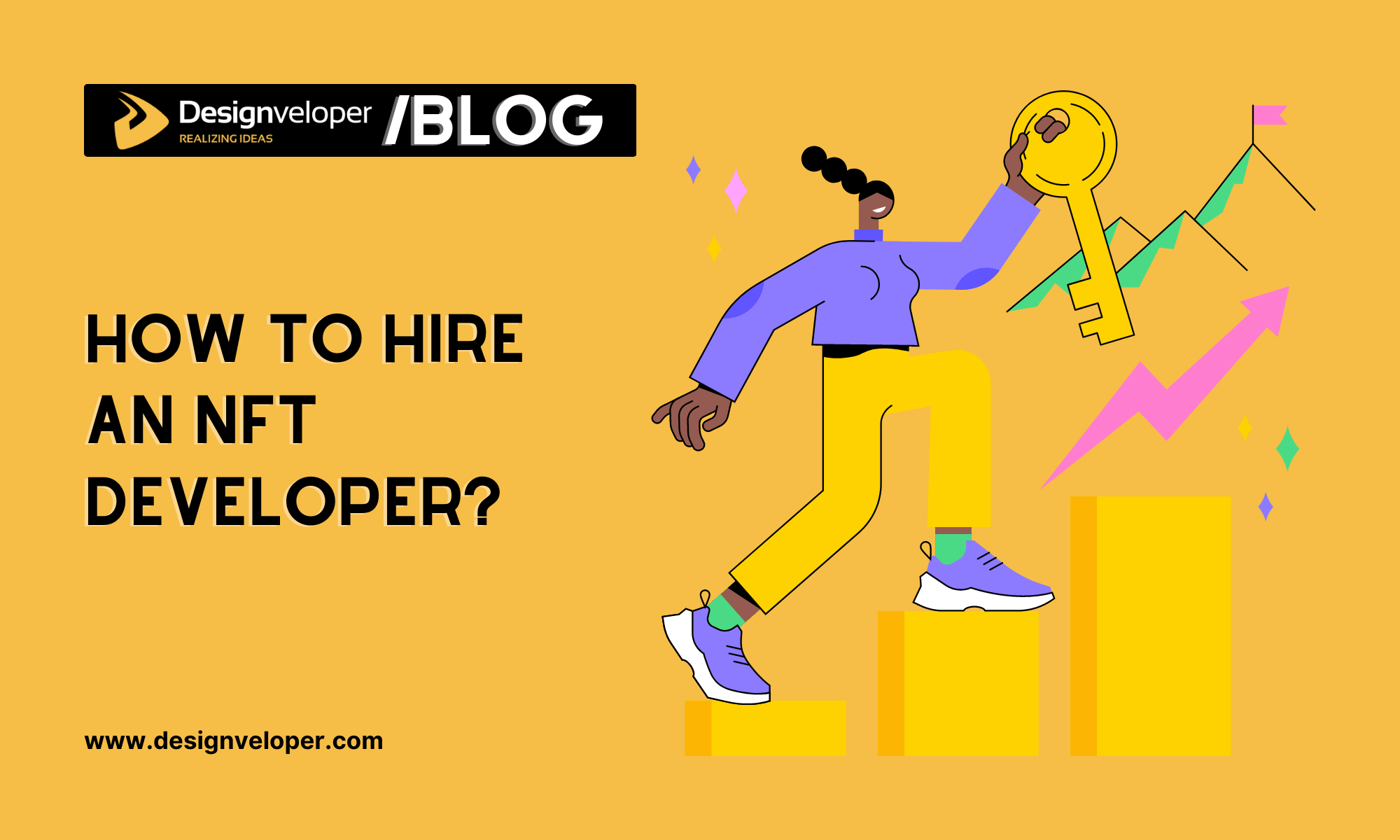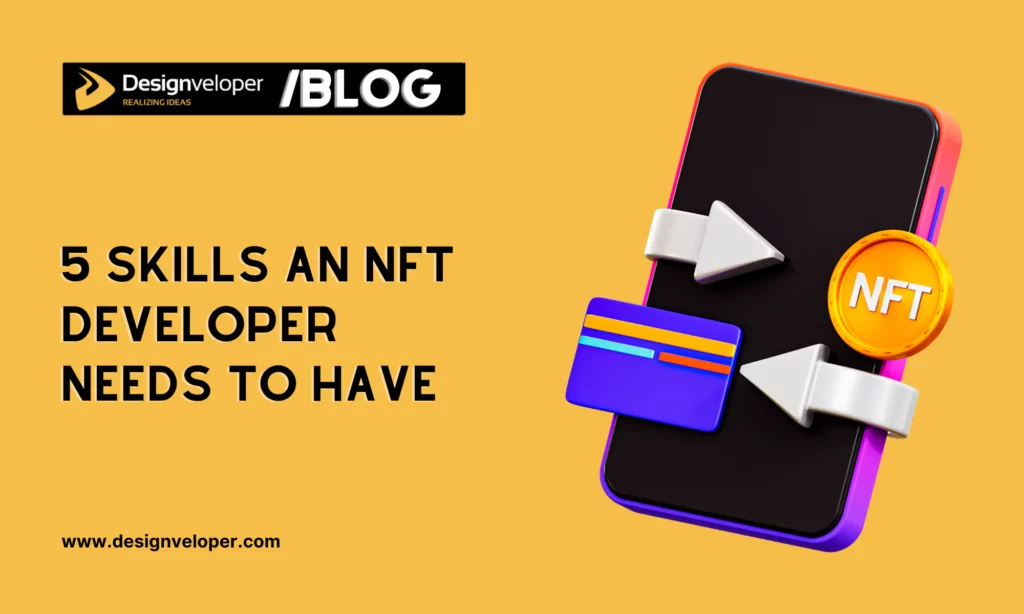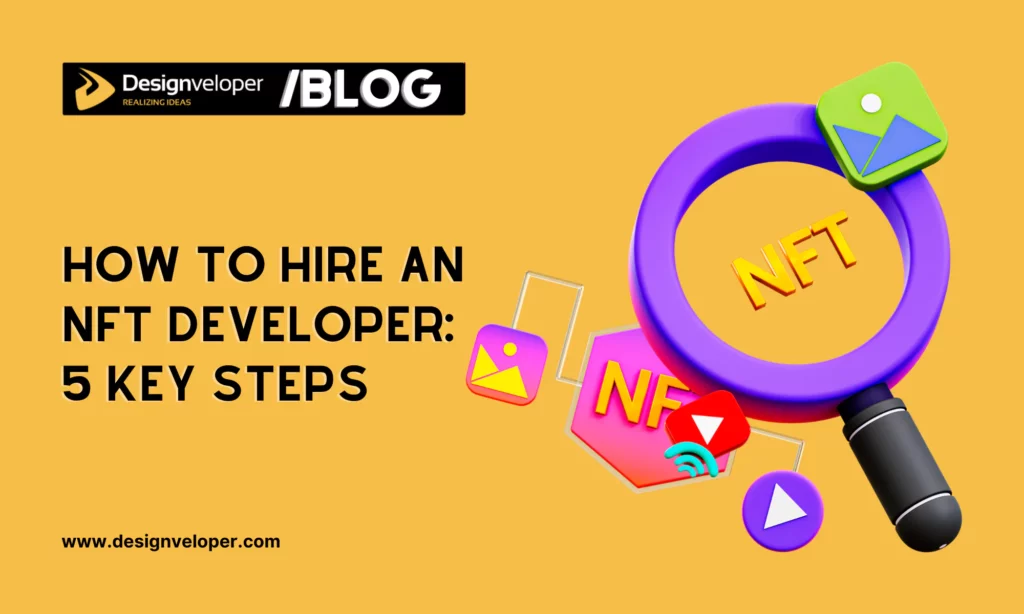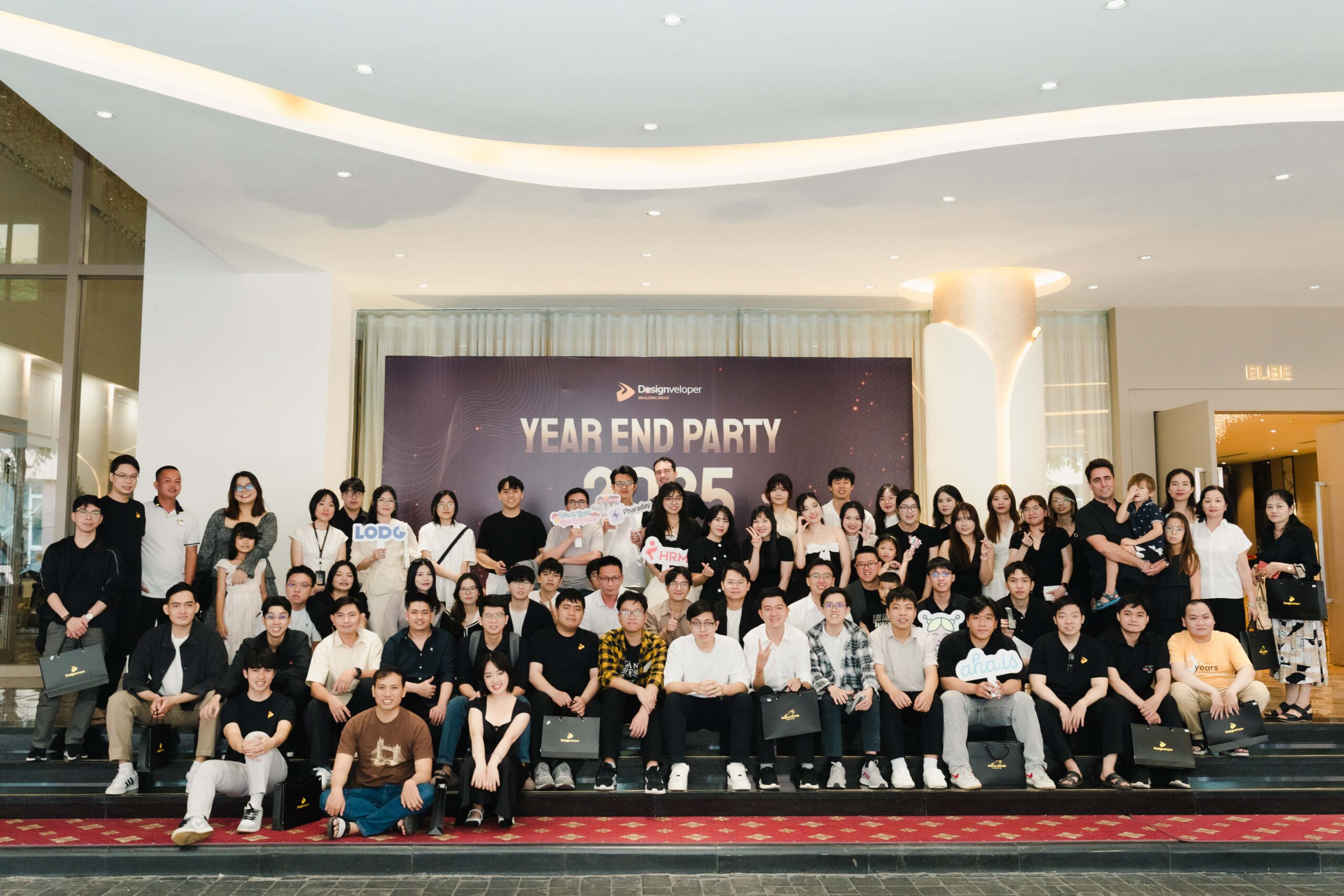How to Hire an NFT Developer?

As we all know, NFT developers are in charge of creating and managing non-fungible tokens (NFTs) on blockchain platforms. These tokens are unique digital assets. They represent ownership of a specific item or piece of content, like artwork or music. Such items have brought multimillion dollars in recent years due to the rising demand for NFTs. Therefore, hiring an experienced NFT developer is critical to the success of your NFT project. But how can you hire one? Let’s discover how to hire an NFT developer in our detailed article.
5 Skills an NFT Developer Needs to Have

There are some argument that NFTs die in the future. However, the practice proves the opposite: the NFT market has still thrived more strongly than ever before, with an impressive CAGR of 34.5% during the forecast period 2024-2030. The rising popularity of crypto, decentralized finance, metaverse, and Web 3.0 are the main contributors behind this growth.
Accordingly, we also see a surge in NFT development projects, from games and digital art marketplaces to music and virtual real estate. Therefore, the demand for recruiting NFT qualified developers also become higher.
However, to ensure these developers can meet your requirements, you should consider whether they have the following skills and knowledge:
1. Deep Knowledge of Blockchain Technology & the NFT Ecosystem
Blockchain is the key factor behind NFTs. So, NFT developers need to have in-depth knowledge of how blockchain works. This knowledge includes consensus mechanisms, cryptographic hashing, and decentralized networks. In addition, they should be familiar with different blockchain platforms beyond Ethereum (e.g., Binance Smart Chain or Flow) and comprehend their unique features with advantages.
Moreover, they should understand other aspects of the NFT ecosystem. They involve how NFTs are created and traded. All this knowledge will help NFT developers navigate the complexities of NFT projects better. Further, they can provide valuable insights into the best practices, tools, and strategies for success.
2. Expertise in Smart Contract Development
Smart contracts are self-executing contracts. This means they will automatically work when pre-defined terms or conditions are triggered. They power NFTs. So, you can say that they’re the backbone of NFT projects.
NFT developers need to have extensive experience in writing and deploying smart contracts, especially using Solidity for Ethereum-based projects. Knowledge of other languages and platforms like Vyper or Rust for Solana is a plus.
3. Experience with NFT Standards and Protocols
NFT standards & protocols play a crucial role in creating, monitoring, and trading NFTs. Therefore, NFT developers need to be well-versed in such standards like ERC-721 and ERC-1155 for Ethereum. These standards define how to create, deliver, and interact with NFTs. Understanding the standards of other blockchain platforms (e.g., BEP-721 for Binance Smart Chain) or IPFS (Interplanetary File System) is beneficial.
4. Understanding of Security Practices and Compliance
In any development projects, security is always important. Blockchain and NFT projects are no exception. Therefore, proficient NFT developers need a deep understanding of security practices. They include secure coding standards, smart contract auditing, and vulnerability testing.
Further, they should be skilled in using frameworks and tools for code analysis (e.g., MythX, Manticore, or Slither) to detect and handle potential security risks. They also need to master the legal and regulatory aspects of NFTs, like copyright laws or digital rights management. This ensures compliance and protects your NFTs products.
5. Communication and Collaboration Skills
NFT development is not a single-person game; instead, it’s a playground where NFT developers have to team up with other members. They include a project manager, blockchain architects and engineers, front-end developers, back-end developers, UI/UX designers, and more. This requires NFT developers to have clear and effective collaboration skills to work seamlessly with these members. Further, good communication skills allow them to swiftly respond to queries and open to feedback.
How to Hire an NFT Developer: 5 Key Steps

Now, let’s discover each step to hire a qualified NFT developer that fits your requirements:
1. Define Your Project Requirements
To look for a qualified NFT developer, you first need to clarify your project requirements. This involves several factors as follows:
Scope of the Project: Are you looking to create a digital art marketplace, a gaming platform with in-game NFT assets, virtual real estate, or something else? Who does your NFT deliverable target? Answer these questions to determine the main objectives you want to achieve with this projects.
Technical Specifications: Next, list all the technical aspects your project requires. Such specs can include the blockchain platform (e.g., Ethereum or Flow), the need for smart contracts, and special features like minting NFTs, implementing royalty mechanisms, or integrating wallets.
Budget & Timeline: Finally, create a transparent budget your project. Don’t just focus on development costs; pay attention to design, marketing, security audits, and ongoing maintenance as well. Additionally, determine a realistic timeline for the project’s completion. To do so, you can break down the timeline into key milestones, including initial development phases, testing periods, and the final launch date.
From our experience, you can leverage techniques like Pomodoro or Planning Poker to estimate time and financial resources. For Pomodoro, for instance, we often choose the task to be done and set timer for 25 minutes (one Pomodoro). We then work on the task during the set time without distractions to see how many Pomodoros we need to complete the task. Imagine the task is estimated to take 10 Pomodoros, it’ll take roughly 250 minutes (4 hours and 10 minutes).
2. Search for Prospective NFT Developers
The following stage is to look for potential NFT developers. You can begin by conducting research and networking within the following resources:
- Freelance Platforms: Websites like Upwork, Toptal, or Fiverr are good places to start. Then, filter candidates by experience, previous project history, and ratings.
- Job Boards and Communities: You can post job listings on general job boards (LinkedIn, Indeed, and CryptoJobList) or specialized platforms (Remote OK or AngelList). Further, you engage with blockchain and NFT communities on Stack Exchange, Discord, or Reddit. You can attend industry meetups, conferences, and hackathons to meet and network with other professionals.
- Social Media and Online Platforms: You can find potential candidates on Twitter by following hashtags such as #NFTDeveloper and engaging with tweets from developers or industry influencers. Or you can explore open-source NFT projects on GitHub to find contributors with active involvement in NFT development.
FURTHER READING: |
1. |
2. Everything About NFT Development |
3. Top 10 NFT Development Companies |
3. Assess NFT Developers
Once you have compiled a list of potential candidates, it’s important to conduct the screening process. There, you give them a comprehensive examination to make sure they’re up to the task. Accordingly, you evaluate their technical expertise, experience with NFT projects, soft skills, and more. Here’s how:
- Initial Screening: First, look through their portfolios and previous work to get a sense of their experience and skill level. This will shortlist candidates with relevant experience in NFT development.
- Technical Review: Next, conduct technical reviews to evaluate their knowledge of programming languages and blockchain technologies. Inquire about their approach to developing NFTs and how they would deal with any issues that may arise during the development process.
- Cultural Fit: Evaluate how these candidates fit your team’s culture. To do so, examine references and online evaluations from prior clients to get a sense of their work ethic and ability to deliver high-quality results on schedule. Further, it’s crucial to assess their communication skills, teamwork, and problem-solving abilities.
Using these criteria, you can thoroughly assess all the expertise, experience, and skills of potential NFT developers. Accordingly, you identify candidates who are well-equipped with the right skills and mindset to contribute your project’s success.
4. Conduct Technical Interviews and Evaluations
Only assessing those candidates through profiles or past projects is not enough to conclude whether they’re the right fit to your NFT project. Therefore, it’s essential to implement technical interviews and evaluations. They involve:
- Technical Interviews: You can conduct deep technical interviews to further discuss their hard skills, experience, and approach to NFT development. Accordingly, ask scenario-based questions, problem-solving tasks, or specific NFT-related challenges they faced or solved.
- Behavioral Interviews: Next, ask some questions to understand their work ethic, ability to work under pressure, and other soft skills.
- Practical Test: Consider assigning a small test project or problem related to your requirements. This will give you a hands-on evaluation of their practical skills. For example, you may test how they candidates create a simple ERC-721 NFT smart contract that allows users to mint new NFTs and transfer ownership.
- References & Testimonials: Further, you can contact their previous clients or co-workers to see how their performance, reliability, or work ethic are evaluated.
5. Agree on Conditions and Collaborating
When you’ve chosen a qualified NFT developer, it’s time to negotiate a detailed contract and get started. Set expectations and goals for the project, look into payment and compensation structures, and make a timeline and plan for the project.
Set up ways for people to talk to you and give you feedback and updates so that you can stay in the loop while the project is being made.
Conclusion
Finding the ideal NFT programmer is challenging, but crucial to the success of your project. Hiring an NFT developer requires knowing the basics of NFT development, finding potential developers, thoroughly analyzing them, negotiating terms, and working together. Collaboration and open dialogue should be highly prized.

















































